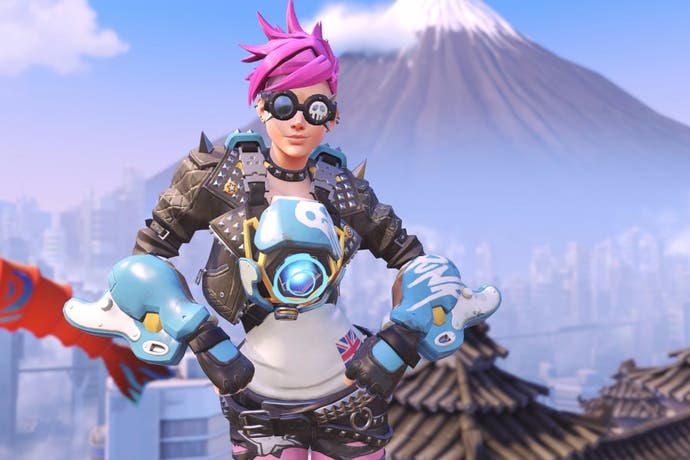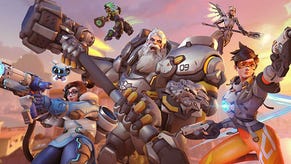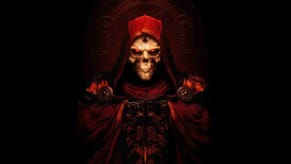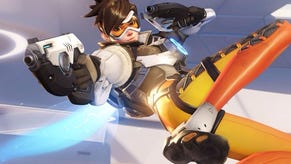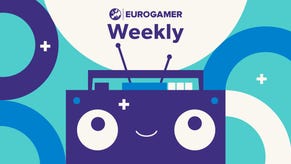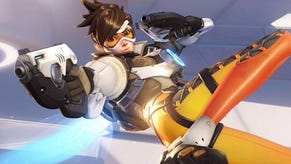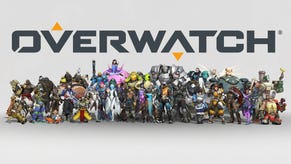Selling loot boxes and the trouble with ranked play - Blizzard on Overwatch
"I think players who claim they want competitive play are often not agreeing on what 'competitive play' actually means."
The Overwatch beta is back and it's brought with it a levelling system that never really stops. If players keep playing, they'll keep on levelling, and Overwatch, in turn, will continue to reward them with lovely glowing boxes full of loot. Inside you'll find new character skins, animations and spray paints (what is it with FPS games and graffiti, by the way?), some of which are considerably rarer than others. And because we're talking about Blizzard here, a lot of this stuff looks really, really great. Players want to own it.
Which is why it's not a huge surprise to see that Blizzard are likely going to sell these loot boxes to players that don't want to wait for the next level up. In my interview below with Overwatch's game director, Jeff Kaplan, we talk about what that might end up looking like and why they decided not to offer a skin store, in a similar fashion to say, Heroes of the Storm.
Overwatch won't be a free-to-play game and I think it's worth reading how the developers justify any additional microtransactions, but for me, the most interesting part of this interview comes towards the end. Will Overwatch have a ranking system in place at launch, and how on earth do you make it work? It turns out that's a very complex question to answer and one that I was pleased to see Kaplan tackle pretty openly.
Join us below as we discuss loot boxes, ranked matchmaking and the future of the Overwatch beta.
Let's talk about the new progression system. Looking at the beta right now: is that a good representation of how it'll work at launch?
Jeff Kaplan: Yeah, absolutely - I think what's there is the core. It's been extremely successful so far and players are engaging with it exactly as we'd hoped. Before launch you'll see more content come into the system. We have legendary skins coming in for all heroes and we're still not finished with the game modes, so you'll definitely see more content. We might learn something over the next couple of weeks that makes us tune something differently, but for the most part it feels like we're in the right ballpark and we're pretty happy with how the system is progressing.
But you do see this progression system as something that Blizzard will keep adding to over the coming months, and perhaps, years?
Jeff Kaplan: Yeah we want to keep updating the loot boxes as long as players want there to be updated items. If it's a system that players are really excited about and they want to see more skins, sprays and animations - we'd love to make them. So we're kind of following the community's lead on that one.
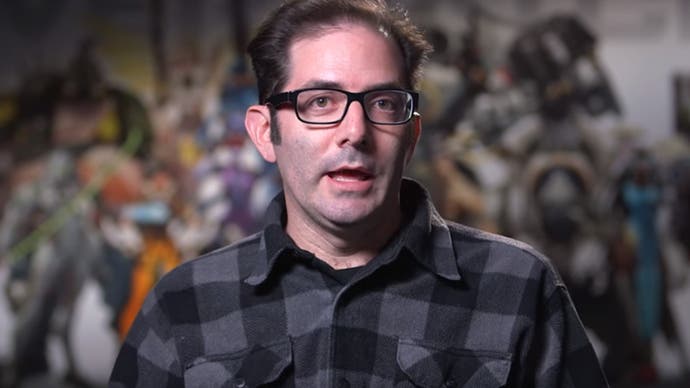
Now as it stands, the loot packs are unlocked with each level. But, it does look like you're thinking about selling them as well, although I know that hasn't been confirmed. Are you going to, and how would it work?
Jeff Kaplan: We were running the progression system internally for about two months before the beta came back and one of the things we saw a demand for was: "hey, this is really cool, but I'd also like to be able to buy these loot boxes". So that's something which we're very open to and it's very likely to be in the game in the future. People have asked us about buying credits and we don't have a plan for that right now. Of course, all of that could change. We're listening to feedback and watching player trends, but right now, that's the direction we're leaning. We feel like because this system has infinite levelling, it's a good system. Players can earn whatever they want just through playing, if they prefer. And if somebody wants to shortcut the time by buying a loot box, that seems okay to us as well.
One of the things we were really excited about with this system is that before we had announced what we were doing for progression, there was a lot of speculation within the community that we were going to have a skin store. That was the most common thing that we heard being requested. We explored that and thought it might be really cool. It was something the players wanted and it could be good for our business, but you know, we have our core values around this orc statue we have in the centre of our campus here in Irvine. The plaque that's front and centre, and the value that we put first, is gameplay.
And so when it came to designing the progression system, rather than just immediately going for a skin store, we really tried hard to come up with a way where players could get skins just through gameplay. How can they play the game and get this thing, where we're not just immediately going for a store type of option. I think the system we came up with is very good for players. It rewards those who just want to play and get their stuff and never be bothered with any sort of microtransaction. But it also - if we have these loot boxes for sale - adds an avenue for people who don't have as much time but still really want to get a certain skin. They'll be able to buy some boxes and either get it in the box, or get enough credits to be able to eventually buy it.
The reaction that I've seen so far has been positive, largely I think, because players are glad to see you standing by your promise to not sell heroes or maps. That's still a core principle for you, right?
Jeff Kaplan: Absolutely.
Looking at the model you're talking about here, it does remind me of what we've seen from some of the big MOBA games out there. In your mind, is this a way for you to fund Overwatch in the long term, both when it comes to new features and support. Is selling cosmetic items a way for you to make that seem viable?
Jeff Kaplan: Our CEO, Mike Morhaime, stated a couple of years ago that every Blizzard game from that moment forwards was to be treated as a life service. There was no such thing as a one-off game that we're going to put in a box, put on a shelf, and after we sell it, move on to the next game and never look back. I think we've evidenced this greatly with products like Diablo 3. If you think about Diablo's launch, many years ago, and the fact that it's receiving major, vibrant content updates - there's a full team working on Diablo 3 right now, which shows our level of commitment and support. The same goes for Overwatch.
I want to be careful how I say this, because we're humbled to be surrounded by franchises like StarCraft, Warcraft and Diablo, and I'm not claiming that Overwatch is worthy of being recognised alongside those franchises. But we're hoping to make strides in that direction and that Overwatch could someday enjoy a longevity like a Warcraft could. With that in mind, we're in it for the long haul. It's not just this one shot, brief idea that we've had that is Overwatch, and then we're one and done. We really want to see what we can build this game to be. We really want to see what the community wants the Overwatch universe to become and what other games could exist within that universe. With that in mind, we just have to be thoughtful about how we're going to support that long-term and how can we keep robust development going behind the game for the foreseeable future.
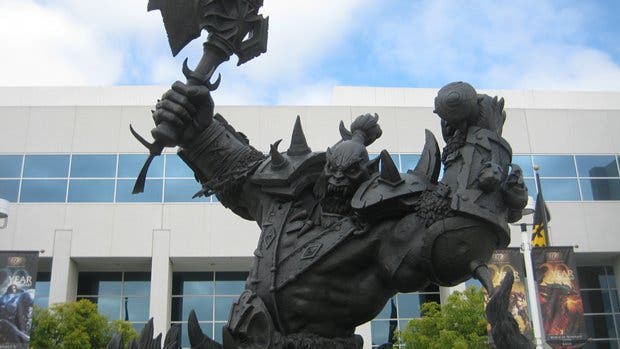
Do you have any idea of what to expect there? I mean, presumably, you can look at the reaction so far and get an idea of whether you're on the right track. Is Overwatch going to be a big game?
Jeff Kaplan: So we have company forecasts: a large group of very competent people who know what they're doing, but I'll give you my personal opinion, which is separate from whatever forecast they might give. I have no idea how Overwatch is going to be received. I don't think anybody really does until it's out there in the public's hands and they're playing it. I've been through betas before with World of Warcraft and I've watched what players have said in beta and sometimes it's a little bit of a game. There's a little bit of lobbying that goes on with the beta community, where they know they have a lot of influence, so they'll say things to sway public view one way or another. I have no idea.
I feel like the players in the beta right now have been fantastic. Their feedback has been amazing. They've said a tonne of great things and really engaged with the game. They're playing it a tonne and seem to be having fun. Where they have critical feedback of the game, we agree with their feedback- we're worried about the same things that they're worried about. I feel aligned with the community and I feel that the game is engaging and compelling. I feel like we're throwing every amount of effort and resource towards Overwatch being a great live service once it gets out to the public. So we're doing everything that we can, but will it be a huge game? I think that's for the community to determine on launch day, and beyond.
Speaking of launch day, that's still unspecified for the time being. I know you've told us to expect it by, or before, the 21st of June. Is that still the plan?
Jeff Kaplan: The 21st of June is a bit of semantics. Basically what we've committed to is that we want to release this game in the spring of 2016. I'm no legal expert, but I believe the 21st of June is the last day of spring, so that's not our release date. Sometimes we've confused players in the past, because we try to think as globally as possible at Blizzard, but sometimes when we say "spring", we're neglecting the southern hemisphere. So, we like to clarify with dates as well.
But 'spring' is still on the cards?
Jeff Kaplan: Oh absolutely, that's our plan.
So between now and that launch date, what are you up to?
Jeff Kaplan: The list is pretty solid. I can't sleep at night because that's all that's in my head, this list, so I'm happy to talk about it. Obviously there's tuning and balance that's going on right now. Today we're going to talk about Torbjörn and Bastion, as the community is very upset about them. There's bug fixes and a lot of polish to be done all over the game. All the systems and content are getting some degree of polish: from the maps, to the user interface, to the options screen. We have some more content, some surprises that I'm excited about. And then we are also working on a refresh of the new player experience. We're revising the tutorial right now. We hope to have a more solid flow from the tutorial into the practice range, into Player vs. AI. We're adding difficulty selection to Player vs. AI, so you can choose to play against easier or more difficult bots.
So that's coming up, and we're also actively working on ranked play, which is something that the community has been asking about quite a bit. It's one of our current focuses and the biggest question we get is: are we going to have it in place for launch day? We don't yet know. We're hoping to get some version up on the beta and start testing something. I don't know when that would happen, but it will most likely be in late March or early April at the soonest. And then we'll need to make a decision on whether to launch with that feature, or we might decide that it doesn't feel up to prime time and we're going to pull it and take the time to work on another iteration. We would definitely have that feature in some day, but we just don't know if it'll be there for launch or not. Really we just need to finish up the game at this point.
With the ranked play, I don't if you're ready to speculate any further on what that may look like? Are there any specific models that the team are thinking about at the moment? Any particular games that have served as inspiration?
Jeff Kaplan: I'm happy to talk about it, but it's important that I state that we haven't committed to a direction, so the feature is not yet implemented. This is just me pontificating about what the feature could be. But you asked about the games we look at. We're very fortunate to be surrounded by a lot of talented developers here at Blizzard that have worked on these kind of systems.
We're looking a lot at what Hearthstone does, what StarCraft 2 did, what Heroes of the Storm does, and of course we look at other games that are out there as well. We're active Rocket League players, League of Legends players, Counterstrike players, so we have an awareness of lots of other systems that exist as well. The nicest part of having those developers nearby that have worked on things like the StarCraft 2 ranking system and the Hearthstone ranking system, is that they can help guide us on what works and what doesn't work. We're trying to collect as much information from those guys as possible and get some really good guidance from them.
In your mind, what makes a good ranking system? What would you be happy with and what do you need it to achieve?
Jeff Kaplan: A ranked system is extremely difficult for a number of reasons. I think players who claim they want competitive play are often not agreeing on what 'competitive play' actually means. So I'll give you an example: in an earlier interview, I'd stated that we were looking at 6vs6 team matchups for competitive play, because in my mind it's a competitive game and a team sport, and the only way to play it competitively is in a 6vs6 scenario. Players really rallied against this and they said they really needed a solo queue, to give them a sense of progression and feel themselves getting better. And then I kind of took a step back when I was reading this feedback and I realised, okay, competitive play means something different to all sorts of different people.
In my mind as a game developer, competitive play means how do we have the most competitive system, when in fact, what I think a lot of people are asking for is a more serious place to play the game where they can feel some skill progression in their own experience. That's different to what I was interpreting it as. I think both points of view are completely valid, and I think there are way more that just those two interpretations. It's really about coming up with a system that speaks to as many players as possible.
Is it possible to tick both of those boxes? Can you create something that offers a sense of solo progression, whilst also putting together the fairest possible match setups?
Jeff Kaplan: Obviously, it's a way different game, but I think Hearthstone achieves this. You'd be shocked how many people play Hearthstone just to get to rank 20 and get their card deck each month. And then there's this whole other group of players that plays all month long and is on the ladder anywhere from rank 4 to rank 20. And then there's an extremely competitive group of legendary players that are actually stack ranked against one another and are engaging in that system. I think Hearthstone is a great example of a competitive system that bridges the gap between - and this is going to be a phrase that people will think is funny that I say - almost casual competitive to hardccore competitive. I think Hearthstone does a really good job of capturing all of those types of players.
The trick with Overwatch is that it's way more difficult to ensure fair matches because we're a team game. We're 6vs6 players and we allow hero switching, so there are so many variables that come into play that are completely out of our hands. You might be the top Widowmaker player in the world and have literally never played Mercy, and when we matchmake you into a game, this might be the first time you end up playing Mercy. How should the game rank you and how are we to know that you're going to switch over to Mercy for that match? We have a lot of challenges that games like Hearthstone don't have, and also games like Heroes of the Storm and League of Legends don't have, because we don't force you to lock heroes in. There are a lot of challenges that we're faced with, that other games don't have.
How long do you think this second beta will run?
Jeff Kaplan: I don't have an exact timeframe. We've said to our players before that we want to run the beta in phases: sometimes it'll be up and sometimes it'll be down. We don't have any immediate plans to take it down right now. We're still gathering some really useful information, with players giving us a tonne of great, subjective feedback. But we're also gathering a tonne of stats on our end that help us tune and balance the game, as well as its matchmaking and server load, all of that. No immediate plans to bring it down, but I don't have a timetable for when it might be brought down either.
Do you think it'll be running, on and off, right up until launch day?
Jeff Kaplan: I believe so. Whenever we have to do balance changes, we're going to want to have some sort of public testing for that. And then also whenever we're trying to scale our server infrastructure, we're going to want some load on that. Whenever we're in those types of modes, which is very common, I think you can expect to see at least some form of beta going on between now and launch.
And I'm sure you're getting sick of answering this one, but I think it shows that your community wants to play your game: are we going to see any more beta invites?
Jeff Kaplan: I don't have a specific answer for you in terms of when the next wave is coming, or how many people it'll be, but we do hope to introduce more players to the beta. We're not done adding players just yet - we're still scaling our servers and we have new things to test. I think you can expect more players to be invited.
To stay on top of all the latest developments, take a look at our dedicated Overwatch site at MetaBomb.
